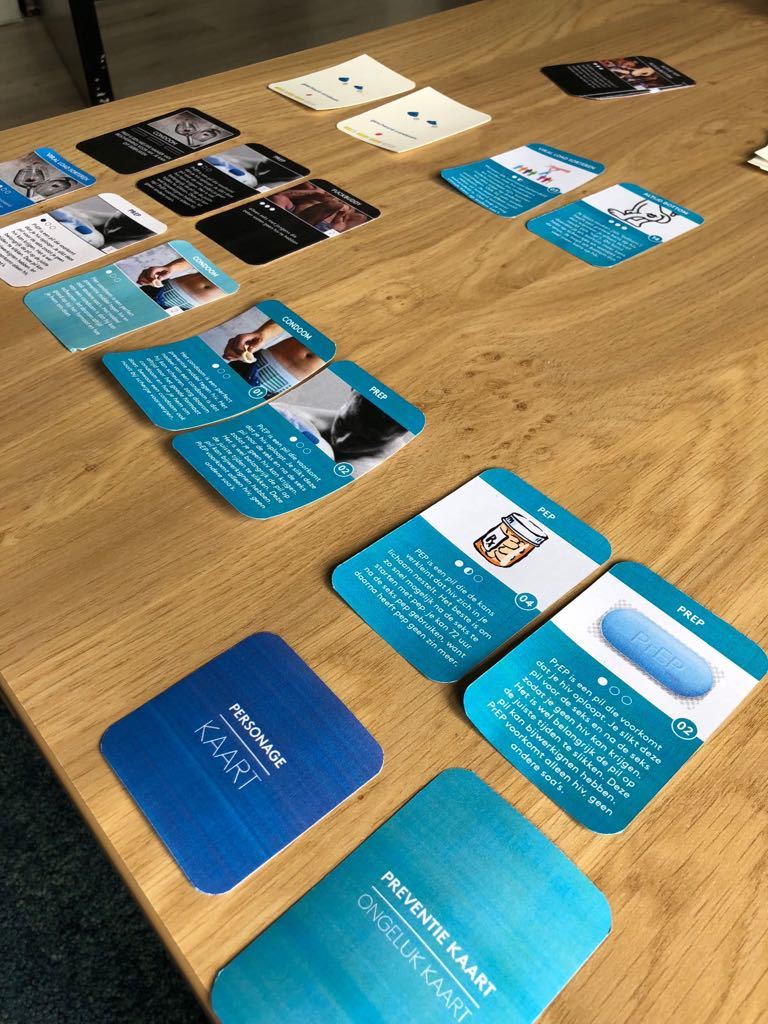Difference between revisions of "(un)safe prevention"
m (Text replacement - "{{GraduationYear selector |Year=2018 }}" to "{{Category selector |Category=2018 }}") |
|||
| (6 intermediate revisions by 4 users not shown) | |||
| Line 1: | Line 1: | ||
{{Article | {{Article | ||
| − | |Subtitle= | + | |Subtitle=by Christian Fokkert |
|Image=WhatsApp Image 2018-05-22 at 14.33.30.jpeg | |Image=WhatsApp Image 2018-05-22 at 14.33.30.jpeg | ||
|Caption=test cards of the game | |Caption=test cards of the game | ||
| − | |Summary=(un)safe prevention: the educational game that discusses | + | |Summary=(un)safe prevention: the educational game that discusses HIV with homosexual adolescents and their parents. The adolescents gain insights in the risks and means of prevention. The parents see the transformation of HIV, as it is no longer a deadly disease. |
| − | |Article= | + | |Article=Homosexual adolescents belong to a high-risk group and have a high chance at contracting HIV. Research shows that half of the homosexual adolescents had unsafe intercourse with their last bed partner of which most cases were one-night stands. That is why I think it’s high time to accept that adolescents don’t always use condoms and that prevention should be aimed more at knowledge instead of just condom use, mainly because there are new, modern prevention methods such as PrEP. |
| − | + | Through the years safe-sex campaigns have not proven to be fit for everyone. I want to show that there are other methods to protect yourself from HIV. By showing the ways of protecting yourself and which situations have a high risk of contracting HIV. By giving these insights in the risks of sexual behaviour I hope that the adolescents can make a healthy choice for themselves. | |
| + | |||
| + | The parents of the homosexual adolescents were through the AIDS epidemic and still think that HIV is a deadly disease. They also don’t know how to help their children to prevent them from contracting HIV. That is why I want to have the adolescents discuss HIV with their parents to better understand each other. | ||
| + | |||
| + | |||
| + | [[Category:Gradwork]][[Category:2018]] | ||
}} | }} | ||
{{Links external | {{Links external | ||
| Line 23: | Line 28: | ||
{{Category selector | {{Category selector | ||
|Category=Reframing | |Category=Reframing | ||
| + | }} | ||
| + | {{Category selector | ||
| + | |Category=Health | ||
| + | }} | ||
| + | {{Category selector | ||
| + | |Category=2018 | ||
}} | }} | ||
{{Articles more}} | {{Articles more}} | ||
Latest revision as of 16:36, 14 June 2019
Contents
Homosexual adolescents belong to a high-risk group and have a high chance at contracting HIV. Research shows that half of the homosexual adolescents had unsafe intercourse with their last bed partner of which most cases were one-night stands. That is why I think it’s high time to accept that adolescents don’t always use condoms and that prevention should be aimed more at knowledge instead of just condom use, mainly because there are new, modern prevention methods such as PrEP.
Through the years safe-sex campaigns have not proven to be fit for everyone. I want to show that there are other methods to protect yourself from HIV. By showing the ways of protecting yourself and which situations have a high risk of contracting HIV. By giving these insights in the risks of sexual behaviour I hope that the adolescents can make a healthy choice for themselves.
The parents of the homosexual adolescents were through the AIDS epidemic and still think that HIV is a deadly disease. They also don’t know how to help their children to prevent them from contracting HIV. That is why I want to have the adolescents discuss HIV with their parents to better understand each other.Links
CONTRIBUTE
Feel free to contribute to Beyond Social.









